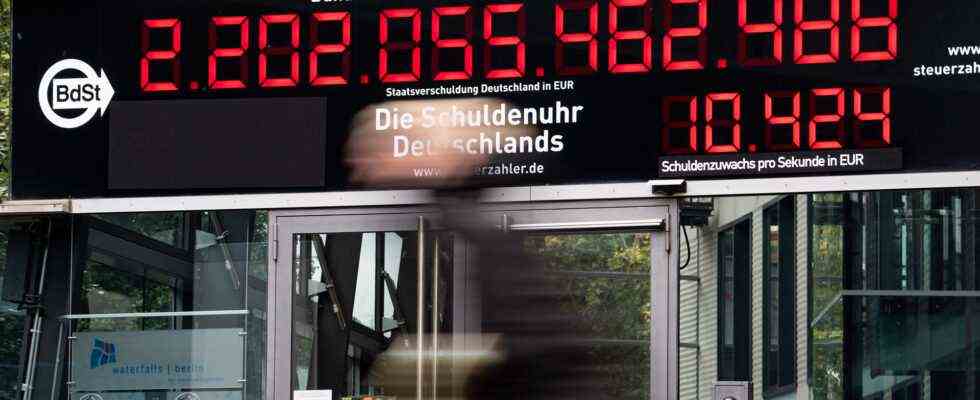Status: 08/24/2021 2:11 p.m.
The Corona crisis drove the German budget deficit to almost five percent of economic output in the first half of the year – more than it has been since 1995. But economists are calm about it.
The measures against the corona crisis and the pandemic-related tax shortfalls are driving the budget deficit and Germany’s debt to ever new heights. In the first half of the year, the minus, i.e. the difference between income and expenditure in the current budget, rose to 4.7 percent of gross domestic product (GDP), i.e. total economic output. “The measures to combat the corona pandemic led to the second-highest deficit in the first half of the year since German unification in 1991,” says Stefan Hauf from the Federal Statistical Office the state budget were taken over.
In fact, government spending in the first six months increased by 6.9 percent to 879.2 billion euros, while income, for example from taxes, only increased by 3.1 percent to 798.3 billion euros. The biggest minus came from the federal government with 67.0 billion euros. It was more than twice as high as in the same period of the previous year. The Corona bridging aid, the compensation payments to hospitals, for vaccines and protective equipment as well as for short-time work benefits and child bonuses made a significant contribution to the increase in expenditure.
The national budget should also close in the deep red for the year as a whole, after having previously achieved a surplus for years. The Bundesbank expects a budget deficit of more than five percent.
Debt grows
Due to the aid measures for citizens and companies as well as the enormous loss of income due to the economic slump at the beginning of the pandemic, the debt level has also grown – from 60 to 71 percent of the gross domestic product.
Nevertheless, economists see no reason to panic. They point out that Germany is still doing better than most other industrialized countries. Italy’s debt is now 160 percent of GDP, while in France, according to Eurostat figures, it is 118 percent. The debt ratio in the USA and Great Britain is also significantly higher than in Germany and is likely to exceed economic output this year, i.e. over 100 percent.
“Reverse trend in revenue”
In addition, most experts expect a decline in both the budget deficit and total debt in the coming year. “Expenditure is likely to normalize again in the foreseeable future, the trend reversal has already set in with income,” says Sebastien Dullien from the Institute for Macroeconomics and Business Cycle Research in Düsseldorf.
The deficit will therefore be noticeably lower in 2022 than in the current year. In addition, the state benefits from the European Central Bank’s zero interest rate policy. Interest expenses fell by 10.7 percent in the first half of the year, despite the increased debt level. “For the year as a whole, it can even be expected that the German state will spend less on debt servicing in terms of gross domestic product than it has ever been since the beginning of all-German statistical recording,” said Dullien.
In growth at the penultimate point
The experts are also placing great hopes on the income side. In the spring, consumers’ willingness to buy helped the German economy grow. The gross domestic product rose between April and June by 1.6 percent compared to the previous quarter, as the Federal Statistical Office announced today. The experts had previously reported an increase of 1.5 percent. Private households in particular provided momentum, spending 3.2 percent more than before. At the beginning of 2021, the economy had shrunk by 2.0 percent.
For the year as a whole, the Bundesbank expects a good 3.5 percent growth in its latest estimate. The International Monetary Fund (IMF) believes that Germany will grow by 3.6 percent. This means that Europe’s largest economy ranks second to last among all industrialized nations. Only the Japanese gross domestic product is expected to expand even more slowly than the German in 2021, so the expectation. The USA and Great Britain will grow by seven percent, France by 5.8 percent.
Worries about the Delta variant and the delivery bottlenecks
It remains to be seen whether the economic management will be able to reach the pre-crisis level again in the second half of the year or not until next year. Economists point out that renewed contact restrictions or massive restrictions on economic activity as a result of the delta wave would destroy expectations. Problems with the supply chains could also lead to major distortions. Only if the bottlenecks do not last too long will the German economy return to pre-crisis levels before the end of the year, says Carsten Brzeski, chief economist at ING Bank.
The Bundesbank has therefore revised the forecast it made in June for the year as a whole downwards, because it underestimated the duration and breadth of the interruptions in supply in the industry. Regardless of the fragile situation, many politicians want to turn the tax screw after the federal election in September in order to generate more income for the state.
The SPD, the Greens and the Left Party want to burden the wealthy more. Union and FDP, on the other hand, rely on more growth. They reject tax increases. The Liberals even promise concrete cuts. The Union also wants relief as soon as there is financial leeway for this, as it notes in its election manifesto.

